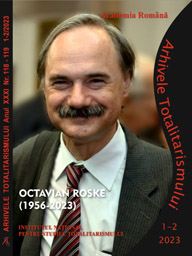„Clandestinul”, un post de radio britanic în limba română din timpul celui de-Al Doilea Război Mondial
„The Clandestine”, a British radio station broadcasting in Romanian during World War 2
Author(s): Ionuț IamandiSubject(s): History, Political history, Recent History (1900 till today), Interwar Period (1920 - 1939), Post-War period (1950 - 1989)
Published by: Institutul National pentru Studiul Totalitarismului
Keywords: radio; broadcasting; clandestine radio; World War II; BBC; Political Warfare Executive; Special Operation Executive; black propaganda; white propaganda; Nazi propaganda; Romania; monitoring;
Summary/Abstract: In the early 1930s, the British government realised that it was far behind other governments (such as the German or the Soviet) in foreign propaganda over the radio airwaves, the new and revolutionary communication medium of the era. The prospect and outbreak of the Second World War precipitated London’s actions in order to overcome the handicap. The European service of the British Broadcasting Corporation, the public radio company, was developed. Starting with 1939, Romanian was also among the foreign languages in which this service was approved. But the British government did not consider this measure sufficient. It also constituted a network of “clandestine radios”, complementary to the official one. These radios targeted listeners in German-allied or German-occupied countries. Such a radio also broadcast in Romanian, and soon it came to the attention of the authorities in Bucharest. The present article is based on the monitoring that the Ion Antonescu government (1940-1944) did regarding the broadcasts of this radio station, monitoring kept in the military and civil archives in Romania. Based on these documents, the article identifies the editorial line of the British clandestine radio in Romanian, in the period 1940-1943. As expected, the radio virulently criticized Nazi Germany and its Romanian ally, the Antonescu government. The clandestine radio enjoyed a much greater freedom of expression than that of the Romanian section of the BBC. Clandestine radio had a strictly secret status, but nevertheless, making use of later testimony, this paper attempts to identify the contributors to the radio, who have been mainly recruited by the British from the members of the Romanian embassy in London.
Journal: Arhivele Totalitarismului
- Issue Year: XXXI/2023
- Issue No: 1-2
- Page Range: 145-162
- Page Count: 18
- Language: Romanian
- Content File-PDF

